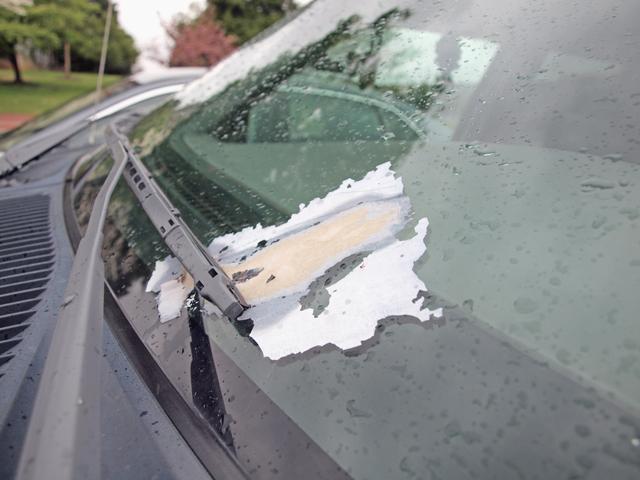
© 2011 N.C. State Student Media.
Damage from an advertisement left on a car's windshield in an RW-Zone parking lot. Damage like this is fairly common in parking lots near dormitories. Many advertisers, like the Fubar night club in Raliegh, print their advertisements on paper that leaves hard-to-remove residue if exposed to heat and rain. Photo by Aaron Andersen.
Students parking in West Campus lots should be wary of the potential damages caused by flyers from downtown club Fubar.
Phillip Christofferson, a junior in political science, was one such student who found his windshield ordained with Fubar’s fliers, advertising their college night hours and drink specials.
These fliers, often getting wet from the recent rainy weather, are very difficult to remove from car windshields once they are dried.
“I thought it was against University policy to leave stuff on cars,” Christofferson said. “To be honest, it’s just obnoxious, and I’m sure I’m not alone in thinking that.”
Regardless, University policy doesn’t outright prohibit solicitation, and anyone can pick up a permit from the University to legally solicit, according to Larry Ellis, lieutenant in the public safety division of Campus Police.
“Anyone who wants to solicit, or leave things on cars, et cetera, must first go through Talley and pick up a permit for solicitation,” Ellis said.
According to Carey Kidd, owner Carey Kidd Entertainment Group and graphic designer for FUBAR, they no longer leave fliers on campus.
“We stopped doing that several weeks ago,” Kidd said.
When asked why, Kidd said it was because he and his company “weren’t allowed to do it.”
But John Garrison, a junior in computer science, said he found some on his truck recently.
“I’m not sure when they’re saying they stopped,” Garrison said, “But I found some on my windshield a couple weeks ago.”
If students don’t find them soon after they’re left, the flier adheres to the glass and becomes hard to remove.
For Garrison, the clean-up is going to take awhile.
“The back peeled right off, leaving the color ad stuck,” Garrison said. “It’s hard to scrape and I’m going to have to take it and get it scrubbed off somewhere.”
Christoffersonsaid he thinks he found the one on his car soon after it was left.
“I think I might have got it shortly after they put it out, because I got it off pretty easily, but I still see cars with the residue and it’s definitely going to be hard to get that off,” Christofferson said. “I know most of us that don’t have a problem getting it off will just toss it on the ground, which is bad because it creates trash. The solicitor is causing more work for University Facilities and they’re not getting business because we all think it’s obnoxious for them to do this.”
According to Ellis, as long as there isn’t any damage done during clean up, there isn’t a way for students to take legal action towards the solicitor.
“They can do a tort claim through Legal Affairs if there is intentional damage done, but that’s only if they can prove there was intentional damage done,” Ellis said. “Then Legal Affairs would determine who would be responsible for the fine and the cost of removal of the problem.”
According to Ellis, when Campus Police come across someone soliciting, their first step is to ask if the person has a permit. If they do, and it is shown, then they leave them alone. If not, it’s custom to inform the solicitor they have to leave until they have a permit.
“We ask if they have a permit, and if they don’t they can be trespassed from the University, but normally we inform them first,” Ellis said. “Many people don’t know that, since it’s such an open campus.”
For Christofferson, the solicitation practice is counterproductive, since he said their efforts turn him away more than encourage his patronage.
“I don’t think they should be able to do it, but it should help if they pay for any costs people have to pay someone to get it off,” Christofferson said. “I know these things are hard to enforce, but it doesn’t motivate me to go there if I have to fight to get it off my car.”